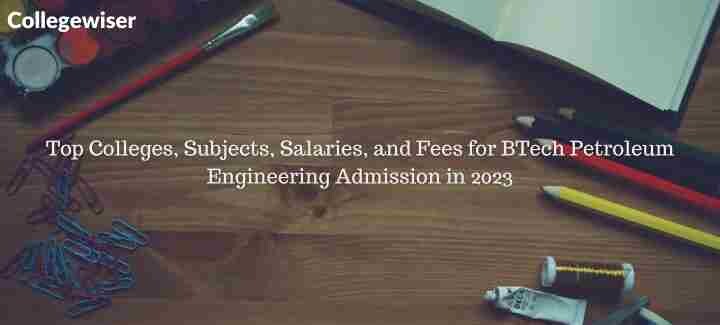Admission for BTech Petroleum Engineering 2023–24: Petroleum Engineering BTech is a 4-year undergraduate degree program. Naturally, the period is four years. There are eight semesters total, with two per year. Students must have earned at least 50% in PCM in their 10+2 coursework from an accredited institution of higher learning or an equivalent to be eligible.
Enquiry Now!
This course is focused on the exploration and production of oil and gas. The course’s goal is to instil professional practice in the field of petroleum technology. A pay package between INR 20K and INR 30K is promised after the training is finished. Depending on the university, the course’s total cost ranges from 4 lakhs to 8 lakhs.
Highlights of BTech Petroleum Engineering Admission
| Course Name | BTech Petroleum Engineering |
| Course Level | Under-Graduate |
| Duration of the course | 04 Years |
| Examination type | Semester System |
| Eligibility | Passed 10+2 exam with 50% marks in Physics, Chemistry, and Mathematics as main subjects |
| Admission Process | JEE Main, UPSEAT |
| Course Fee | 04 lakh – 08 Lakh for 4 years |
| Average Starting Salary | INR 20K to 30K per month |
| Job Position | Petroleum Upstream Engineering and Petroleum downstream Engineering |
Admission to BTech Petroleum Engineering programs is frequently entrance- and merit-based at universities and colleges. For admittance to this course, students must have earned a grade of at least 50% in PCM in their 12th grade year. A BTech Petroleum Engineering distance learning programme can be finished both on-campus and online. Students who successfully complete this course will have improved employment options.
One of the essential components of the work of petroleum engineers is designing and developing effective and affordable technology to extract these petroleum resources. Additionally, they monitor the drilling process and make sure that the minerals are extracted safely and stored correctly.
Admission to BTech Petroleum Engineering 2023–24
The program involves the development and ejection of crude oil and natural gas. It uses technical analysts to predict their future performance. Petroleum engineering interacts with a variety of engineering specialties, including mechanical, chemical, and civil engineering.
BTech Petroleum engineering combines the fundamentals of chemistry, physics, and math with those of mechanical, chemical, and civil engineering. Petroleum engineering is a branch of engineering that deals with activities related to the production of hydrocarbons, such as crude oil or natural gas. The future is filled with opportunities and challenges for petroleum engineers.
Two major specializations fall under the umbrella of petroleum engineering:
Petroleum Upstream Engineering – This is a preparatory field focusing on the fundamentals of oil and gas exploration and production.
Petroleum Downstream Engineering – This additional type of specialization deals with the practical aspects of processing technologies for petroleum refinery and natural gas, including the production phase, cost estimating, and budgeting.
current updates
The UPES University is still accepting applications for the BTech Petroleum Engineering program. The deadline is June 30, 2023.
The deadline is June 30, 2023. To (tentatively) submit an application for admission to the BTech Petroleum Engineering program at MIT World Peace University for the 2023–2024 academic year.
The deadline to apply for BTech Petroleum Engineering admission at DIT University is July 15, 2023, for the academic year 2023–2024. BTech Petroleum Engineering Entrance Exams, possibly
Several colleges/universities, as well as state and federal examination agencies, conduct entrance exams for the BTech Petroleum Engineering Admission. The following is a list of some of the popular admission exams being conducted right now:
National Equality and Entrance Test (NEET)
Karnataka KCET: Common Entrance Test
MHT CET, or Maharashtra Health and Technical Common Entrance Test,
Main Entrance Exam (JEE MAIN)
Exam for Joint Entrance (JEE ADVANCE)
University of Petroleum and Energy Studies Entrance Exam (UPESEAT) and Birla Institute of Technology and Science (BITSAT)
Structure of Fee
The average cost of a BTech Petroleum Engineering and Technology course in India is between INR 4 and 8 lacs for the entire course.
Process for Submitting an Admission Form for BTech Petroleum Engineering in 2023–24
Admission to the BTech Petroleum Engineering program is solely determined by the marks earned in the admission exam. The candidate should visit the official website of the entrance exam, such as JEE Mains, UPES, etc., to stay updated regarding registration deadlines, exam dates, and results announcements. It is advised that students look into the various admission tests and participating colleges.
Students can apply for private institutions directly by enrolling on their official websites and meeting their minimum conditions, such as the 10+2-mark, age restriction, admission exam cut-off, etc.
Admission to BTech Petroleum Engineering: Motive
The swift increase in oil demand throughout the world and the scarcity of the oil, particularly in developing nations, have caused oil prices to skyrocket. High oil prices lead to an increase in oil exploration and production, creating a greater need for qualified petroleum engineers. The benefits of this course are listed below.
Petrol engineers are in demand not just in India but also in other foreign countries like the USA, UAE, etc.
Petrol engineers are well compensated in the pharmaceutical industry due of the risk and uncertainty associated with their work.
In order to ensure effective and efficient processing of crude oil, petroleum engineers play a crucial role in their industry. This course aids in the development of the knowledge and abilities necessary to plan and create a method for the extraction and conversion of oil into useful goods.
The course syllabus includes topics like geography, drilling technology, petroleum production operations, surveying, etc.
Admission Syllabus for BTech Petroleum Engineering 2023–24
| First Semester | Second Semester | |
| Mathematics I | Mathematics II | |
| Physics Lab | Chemistry Lab | |
| Physics | Chemistry | |
| Introduction to Computing | Introduction to Data Structure and Algorithm | |
| Humanities and Social Sciences (HSS) elective such as Business Communication I | Humanities and Social Sciences (HSS) electives such as Business Communication II | |
| Engineering Mechanics | Engineering Thermodynamics | |
| Engineering Drawing | Workshop Lab | |
| Basic Electrical Engineering | Basic Electronics Engineering | |
| Third Semester | Fourth Semester | |
| Mechanical Engineering – I | Mechanical Engineering – II | |
| Petroleum Engineering Practical – I | Petroleum Engineering Practical – II | |
| Methods of Applied Mathematics – I | Numerical and Statistical Methods | |
| Humanities and Social Sciences (HSS) Elective such as Organizational Behaviour | Surveying Theory | |
| Geology for Petroleum Engineers Practical Lab | Surveying Practical Lab | |
| Geology for Petroleum Engineers | Petroleum Production Operations – I | |
| Drilling Technology | Managerial Economics | |
| Drilling Fluids and Cement | Elements of Reservoir Engineering | |
| Fifth Semester | Sixth Semester |
| Applied Petroleum Reservoir Engineering and Management | Directional Drilling |
| Sedimentary and Petroleum Geology Practical | Composite Viva Voce |
| Sedimentary and Petroleum Geology | Advanced Numerical Methods |
| Project and Term Paper | Project & Term Paper |
| Petroleum Production Operations – II | Petroleum Formation Evaluation |
| Petroleum Engineering Practical – III(Production & Product Testing Lab) | Petroleum Engineering Practical – IV |
| Methods of Applied Mathematics – II | Applied Electrical Engineering |
| Seventh Semester | Eighth Semester |
| Oil and Gas Well Testing | Petroleum Engineering Design |
| Well Performance and Intervention | Oil and Gas Processing System Design |
| Vocational Training Electives (Any One) | Composite Viva Voce |
| Transportation and Marketing of Petroleum and Petroleum Products | Electives (Any One) |
| Petroleum Exploration – Geophysical Methods | Oil and Gas Marketing and Resource Management |
| Petroleum Engineering Projects | Petroleum Eng. Projects and Seminar |
| Offshore Drilling and Petroleum Production Practices | Enhanced Oil Recovery Techniques |
| Industrial Eng. and Management | Pipeline Engineering |
| Health Safety and Environment in Petroleum Industry | Reservoir Modelling and Simulation |
| Elective Paper – 1 | Elective Paper |
| Drilling System Design | Coal Bed Methane, Gas Hydrates & Shale Gas/ Oil |
| – | Advanced Offshore Engineering |
| – | Deep-Sea Production System |
Payroll Packages
Every student’s goal is to develop a successful career and anticipate finding employment after completing the program. For a graduate of the BTech Petroleum Engineering Program, there are a variety of employment opportunities available. The average annual pay in the nation offered to successful graduates in this sector is between INR 3 and 8 lacs.
College Admission for BTech in Petroleum Engineering in India
| College/ Institution | City | Fees |
| Indіаn Institute of Tесhnоlоgу Bombay | Bombay | 5,43,000 |
| Indіаn Institute of Tесhnоlоgу Madras | Madras | 3,86,000 |
| LD College of Engineering Ahmedabad | Ahmedabad | 10,420 |
| M.S Engineering College, Bangalore | Bangalore | 1,14,000 |
| UPES Dehradun | Dehradun | 10,99,500 |
(FAQ) Petroleum Engineering BTech
Is the BTech Petroleum Engineering Course offered via the distance learning option?
Distance For the BTech Petroleum Engineering Admission programme, no mode of instruction is provided.
Is pursuing a BTech Petroleum Engineering Admission from India worthwhile?
The goal of designing BTech courses is to give candidates experience in their respective fields. It is best to pursue BTech Petroleum Engineering Admission if your professional goal is to become a professor, senior researcher, or scientist. B Tech opens up a variety of work alternatives in India that might provide you access to the best pay as well.




